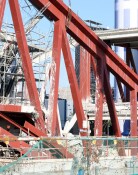Leap for Cheju depends on IT
It is said that a plan to develop Cheju Island as an international free city is being propelled. Although detailed plan has not been confirmed yet, according to provisions that have been revealed so far, they would like to develop the Island dividing it into regions. The plan contains more detailed contents regarding travel industry, culture, arts, education, circulation, and financial service.
An international free city can be defined as a place where finance, business activities, and international trade are freely conducted. It also must guarantee free departure and entry of people and commodities. Because the success or failure as an international free city depends on whether the city can attract many foreign people and businesses, the city has to provide an international level of living conditions and business circumstances. This means that English, the international public languages, should be communicated without difficulty. A transparent and plain business tradition has to be established as well. For this reason, it may account for the difference between an international city and its neighboring region of its mother country.
It is very important for a nation’ s growth to develop an international free city that has its regional distinction and competitiveness. The big question is “How.” Cheju Island has its natural beauty which can be found in its various and fantastic sceneries of the mountains, beaches, and the ocean is a big advantage to attract foreign travelers. However, because the travel industry alone cannot bring success, a circumstance in which multinational corporations can actively perform their businesses is necessary. Especially, because Cheju Island is not currently conducive for such circumstance, a more cautious strategy is needed.
Even though benchmarking of Hong Kong or Singapore for constructing of an international free city is recommendable, the idea to imitate them as only models has to be reconsidered. The reason why Singapore could be distinguished as a center for hi-tech business was that it was able to lure multinational corporations. The existence of neighboring cities of Johor Bahru in Malaysia and Riau in Indonesia as co-operators was a contributing factor too. For that same reason, Hong Kong could be developed as a center of international business drawing many regional headquarters of multinational corporations. In this case, Kwangdung, China played an important role as a production base.
However, Cheju Island does not have a neighboring region that can be a production base. Therefore, it has to use a different strategy from Singapore of Hong Kong. An answer for Cheju can be achieved based on information technology.
Cheju Island needs a new strategy in which the island can function as a hub becoming a network center for East Asia’s information technology industry. The development of information technology made the circulation of information possible. Yet, production of information is limited to some specific areas because of the fact that some areas equipped with quality living condition, pleasant natural surrounding, and good business environment exclusively become gathering centers of brains that make decisions. When a circumstance that makes potential free circulation of brainpower and information technology manpower and innovative business activities is ready, Cheju Island’s true value with its natural advantages can be appropriately appreciated. Therefore, besides the construction of high information technology foundation, it is urgent to establish education and training system that can lure related fields’ manpower.
The travel industry of Cheju Island must be distinguished from other regions by utilizing its unique natural surroundings, traditional culture, and information technology. In particular, they must remember that if a travel commodity can destroy the island’s environment, its own advantages of travel resource will be gone. An innovative and environment-friendly strategy includes development of travel commodities in which its traditional culture can be experienced, and its local products and culture also can be represented.
After all, English has to be used in Cheju Island in order to become an international free city. However, rather than adopting a plan to use English as a second official language right away, it seems to be wiser to prepare a more detailed plan with an attitude of gradual approach. First of all, in the process of adapting English as a second official language and developing the information technology manpower, residents in Cheju Island must be the main decision making body. And it is also very significant to preserve their culture and tradition to be a “representing face” of an international city.
To construct an international city, a huge amount of investment is needed. It is concerning to see the plan becoming nullified caused by the difficulty of fund raising and its long-term commitment for completing the project. Considering the most important factors which are clean international business custom, language, and the industry environment, they have to focus on developing man-power that leads to information-based society and investment on education and training rather than a vast amount of investment.





![매일 풀업 60개씩 하는 75세 회장님… “허리 통증도 없어져”[양종구의 100세 시대 건강법]](https://dimg.donga.com/c/138/175/90/1/wps/NEWS/IMAGE/2025/12/13/132956597.1.jpg)

